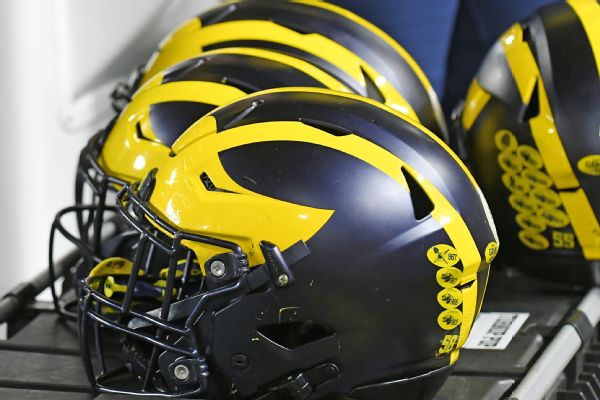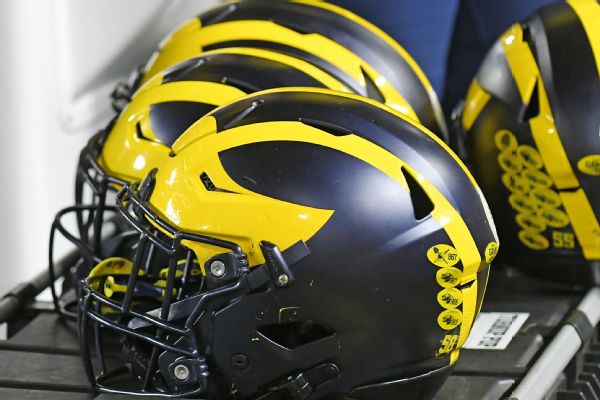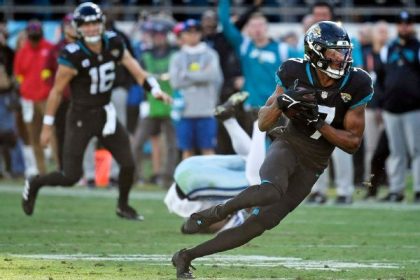
Big Ten athletic directors met with commissioner Tony Petitti on a video call Thursday without Michigan athletic director Warde Manuel present, and sources told ESPN the call about Michigan’s alleged sign-stealing operation took on a distinctly different tenor than when they met a week ago.
Sources said the athletic directors left the call with the notion that Petitti is taking the Big Ten’s ability to punish Michigan over the allegations more seriously than before.
While no potential punishments were discussed, Petitti acknowledged speaking with the NCAA about its investigation, although he refused to divulge any details of that conversation, sources said. One of the issues Petitti brought up with the athletic directors was that he couldn’t make a decision on Michigan this season based on a whim, that he would need a set of facts to go off.
The conversation with the NCAA hints at his willingness to find out the fact set the NCAA could be working toward. It’s not known whether the NCAA would be willing to share information, but it’s telling that the organization gave the Big Ten an initial heads-up on what was alleged, an action taken in part to protect the integrity of games.
Petitti said on the call he needs to still speak with the Big Ten presidents on the matter, have deeper discussions with officials at Michigan and potentially speak again with the NCAA, per sources. That left no decision imminent, but Big Ten officials stressed a different tone.
While parts of the meeting unfolded similarly to the coaches airing their grievances in a call Wednesday, Petitti did get across a message that he has heard the constituencies loud and clear.
“The athletic directors had a clear message — we believe the conference needs to step up,” a source familiar with the call said.
At the heart of the call, much like the coaches’ call the night before, was the lack of faith in NCAA enforcement to quickly investigate and rule on Michigan’s case, sources said. That has brought to the forefront what the Big Ten has the authority to do in the situation. The conference could initiate its own investigation into potential violations of the Big Ten’s sportsmanship policy. While Petitti has the authority to dictate discipline, if it’s beyond a standard level, it must be looked at by an executive committee that could approve, deny or lessen that discipline.
The most powerful message, according to sources familiar with the call, came from Michigan State athletic director Alan Haller. He mentioned the alterations Michigan State needed to undergo in order to prepare for its Oct. 21 game against Michigan after receiving a call Wednesday of that game week about Michigan having Michigan State’s signals.
Haller worried about players potentially getting hurt because Michigan players, in theory, knew where they’d be going on plays.
He also referenced last year, when he said the Big Ten forced Michigan State to suspend numerous players after the tunnel incident in Ann Arbor before the league finished investigating the incident. He pointed out that it was hypocritical that this year, with Michigan under investigation, the league is now waiting for an investigation to unfold.
Haller is not typically one of the more vocal athletic directors on calls, so both his voice and the passion with which he spoke resonated with the athletic directors and Big Ten officials on the call, sources said.
The athletic directors made it clear they were there to support Petitti, who has been in office since April, and help guide him through. While the coaches showed flashes of anger Wednesday, the athletic directors were more measured.
“The athletic directors provided more guidance for a path forward,” said another source familiar with the call. “The coaches spoke from a point of high emotion.”
The NCAA has been investigating Michigan for nearly two weeks, and ESPN sources identified football analyst Connor Stalions as the center of the investigation soon after. Michigan has suspended Stalions, and since then sources have told ESPN that there’s record of Stalions purchasing tickets to the games of 12 of Michigan’s 13 Big Ten opponents over the past three years.
Stalions bought tickets to more than 35 games in at least 17 stadiums over the past three years, sources said. That included two different SEC title games.
The athletic director call came on the heels on the coaches hosting a fiery 90-minute call Wednesday, which a source described as having the tenor of a vast majority of the coaches feeling like “every game they played is tainted.”












